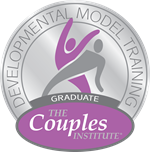Couples and Relationship Therapy
My Approach to Couples Counseling
I know that nobody in a relationship does things perfectly…I've been there myself! At Tidelands Counseling my job as your therapist is to support you in making the changes you want to have in your relationship…improved communication, greater intimacy, and working through the challenges that all relationships face. Other issues that bring couples to therapy include challenges with money management, parenting styles, blended families, non-traditional relationships, gendered role expectations, conflicted values from diversity in upbringing, power imbalances, difference of sexual needs, and balancing family, work, and social commitments outside the relationship. Other life stressors, which may put a strain on a relationship are: preparing for marriage, welcoming children into family, changing or losing a job, moving, the death of a family member or friend, managing chronic illness, aging parents, and changing compatibility and desire throughout the couple’s life cycle.
I understand that the decision to go to couples counseling can be a difficult decision to make. It is completely natural to have worries or fears about taking this leap. “Will the therapist side with my partner and blame me for the problems?”, “What will the therapist think about my behaviors, some of which cause me feelings of embarrassment, guilt or shame?” and “Is my relationship too far gone for counseling to help?” are typical questions our clients ask themselves before making the decision to come to counseling.
A common challenge in couple’s work is healing from trauma. Violations of trust can take considerable time and work to heal…infidelity, use of pornography, intimate sexual violence, substance abuse or addiction, or family violence. Sometimes when these issues are actively present in relationships, couple’s therapy may not be effective. Assessing for safety, and creating an environment for healing is imperative if couples are going to move successfully through trauma together. I will work with you both to discern what might be most helpful, and at times, may recommend that individual work be done before couple’s work so that the couple’s work can be done safely.
At Tidelands Counseling I take a supportive, non-judgmental approach to couples counseling. I have training from The Couples Institute in the Couples Developmental Model, and from The Gottman Institute in the Gottman Method of couple’s therapy. Because no couple is exactly alike, these and other couple’s therapy methods inform mytreatment approach.
At the core of my treatment philosophy is the belief that the only person we are capable of changing is our self. While we might hope that our partner will change, we are truly powerless to make that change occur. It is normal to strongly believe that the other is primarily responsible for the state of the relationship. However, thinking and acting this way often leads to being stuck at an impasse, which is what brings most people to therapy. Since the process for couple’s work may be different from what one may expect, I frame therapy around a series of questions that I will be asking you and your partner:
- What is the kind of relationship that you would like to have? What kind of life would you like to build with your partner? Having a vision of what you want is crucial to the success of any goal.
- What are you currently doing in your relationship to be the kind of partner you would like to be, and to build the kind of life you want to have with your partner?
- What are you doing that gets in the way of building the life you want with your partner?
- What can you do that will help your partner give you what you want and need in the relationship? How can you make it easier for them to be the partner you want?
- What skills do I/we need to strengthen to create the relationship I want?
Within this framework of individual responsibility for change I help you work through the issues that are getting in the way of you having the relationship you want, and to build the skills that you need for success. To learn more about this approach I suggest that you read this important article by Dr. Ellyn Bader of the Couples Institute – How To Get The Most From Your Couples Therapy. I will be happy to discuss any questions you have about couple’s therapy that this article might bring up, and to talk about your specific therapy needs.








